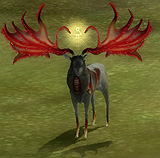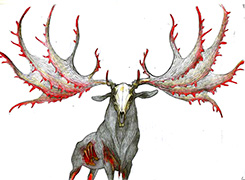

Auriea Harvey & Michael Samyn have just sent word about the latest update to their free-roaming online multiplayer project, The Endless Forest. Packaged as a screensaver, the work comes to life when your computer starts to sleep, recasting you as a stag in a dreamy, meditative forest setting, complete with ruins, ponds, and seasonal changes.
Without boundaries, goals, or levels, the interactive shifts the focus away from objectives and onto the stunning environment, which the team have obviously focused on. Light filters through pines, close objects obscure the player momentarily in a cinematic nod, and your avatar leaps across streams and into lavender glades.

In a strong move based on their interactive narrative backgrounds, the team have disabled any form of text or language communication. Avatars are 'named' with a randomly generated symbol. Communication with other stags takes the form of emotive actions - a bow, a cower, a prance. Language barriers are gone. So is specific communication ("walk to this location","how are you?"). But what Harvey and Samyn realised is that simple interactives require simple communication. Stags play "follow the leader", action their meaning through, or post general notices on a forum ("If I see you and don't respond, I'm sorry, my computer is playing up...").


With such a open-ended base, the team have released updates for special times and seasons. "Endless Halloween" turned stags into a midnight black for a certain time, and enabled costumes like blood red antlers or a Mexican inspired "deer of the dead" motif. The latest event/update combination involves the gods visiting the forest next Tuesday, February 5th at 5pm for a Mardi Gras flower spree.
Of course, EF isn't without it's problems. When I logged on at 10am NZT, there was exactly one avatar in the forest. Me. Exploring the lush environment is interesting for a while, but where EF ultimately wins or loses is it's user base - midnight gatherings of stags, magic spells cast by others, and new emotive gestures added regularly are for naught without others online. A few glitches crop up. It's easy to ruin the Csikszentmihalyi-like flow of galloping through the forest by hitting a tree, or break the realism by using a walk animation when your avatar should be running. But these hardly detract from an interactive which succeeds in pushing the boundaries of what a 'game' is, what 'communication' means, and how time and users can evolve a game world.










